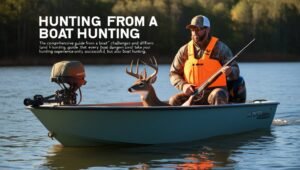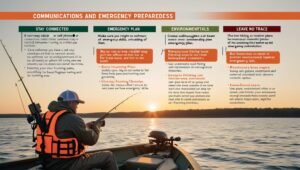
What safety precautions should you take when hunting from a boat?
Hunting from a boat presents unique challenges and dangers that differ from land hunting. Understanding these risks and taking the proper precautions can make your hunting experience not only successful but also safe. This comprehensive guide will highlight the essential precautions that every hunter should observe when engaging in boat hunting.

Understanding the basics of boat safety
Life jackets: Non-negotiable safety gear
The first and foremost rule of boating safety is to wear a life jacket This is a non-negotiable piece of equipment regardless of your swimming ability. Modern life jackets are designed to be comfortable and allow a full range of motion, making them ideal for hunters. They come in camouflage patterns and have features that make them less prone to shooting.
Navigation awareness
Before heading out, familiarize yourself with the layout of the body of water. Use a GPS device or nautical charts to plan your route and understand the terrain. Be aware of shallow areas, sandbars, submerged objects, and potential hazard areas. Additionally, always make sure your navigation lights are working properly if you plan to hunt at dawn or dusk.
Boat equipment and maintenance
Regular boat maintenance
Ensure that your boat is in good working condition. Regularly check the hull for any signs of damage or wear and ensure that the engine and all mechanical parts are functioning properly. A well-maintained boat reduces the risk of mechanical failures that could leave you stranded in dangerous conditions.
Essential Equipment Checklist
Every hunting trip from a boat should include an essential equipment checklist. This should comprise:
First Aid Kit Tailored to address both minor injuries and potential severe accidents.
Fire Extinguisher In case of a fire outbreak, this is a critical safety tool.
Bailing Device Such as a manual pump or bucket, to remove any water that enters the boat.
Spare Fuel and Tools To address minor mechanical issues or extend your range if necessary.
Weather Awareness
Monitoring Weather Conditions
Always check the weather forecast before embarking on a hunting trip. Unfavorable weather can turn a hunting trip into a dangerous endeavor. Tools like marine weather radios or smartphone apps can provide real-time updates on weather conditions. Be prepared to cancel or postpone your hunting trip if severe weather is predicted.
Adapting to changing climates
Even with the best preparation, the weather can change unexpectedly. Be prepared to adapt in such situations. Keep rain gear and warm clothing accessible. In the event of a storm or sudden drop in temperature, it is better to return to shore than risk safety by staying out on the water.
Security of Weapons
Safe Weapons Handling
Handling firearms or bows on a boat requires extra caution. Make sure all weapons are unloaded until you are ready to shoot. Use waterproof cases or sleeves to protect against moisture and prevent accidental discharge.
Stabilization and shooting locations
Maintaining stability in the boat is very important, especially when operating arms. Stand with a wide stance and brace yourself against the hull of the boat if possible. This will help you maintain balance and accuracy while minimizing the risk of capsizing.
Communications and emergency preparedness
Stay connected A two-way radio or cell phone is essential for communication, especially in emergencies. Make sure you have a reliable way to contact someone on shore or emergency services. Notify someone of your hunting plans, including your expected return time and your hunting area.
Emergency plan
Create a well-thought-out emergency plan. This includes knowing the nearest first aid points and understanding basic survival skills. Being prepared for emergencies can significantly increase your chances of dealing effectively with unexpected situations.
Environmental considerations
Understanding impact
Boat fishing can affect aquatic ecosystems. Be mindful of the creation of your boat, as it can disturb local wildlife and destroy beaches. Use quieter engines or oars where possible to minimize disturbance to the environment.
Leave no trace.
Follow the Leave No Trace rules. Make sure all trash and debris is secured in your boat and properly disposed of after returning to shore. Respect wildlife and follow all hunting regulations to help preserve natural habitats for future generations.

